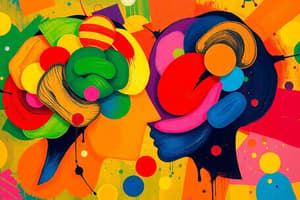Podcast
Questions and Answers
What is the process of acquiring new and relatively enduring information or behaviors called?
What is the process of acquiring new and relatively enduring information or behaviors called?
- Reinforcement
- Learning (correct)
- Conditioning
- Punishment
What is associative learning?
What is associative learning?
Learning that certain events occur together.
What is a stimulus?
What is a stimulus?
An event or situation that evokes a response.
Both classical conditioning and operant conditioning are forms of ________ learning.
Both classical conditioning and operant conditioning are forms of ________ learning.
What is cognitive learning?
What is cognitive learning?
Is behaviorism a branch of psychology that ignores mental processes?
Is behaviorism a branch of psychology that ignores mental processes?
Who is known for studying the digestive system and making significant observations in psychology?
Who is known for studying the digestive system and making significant observations in psychology?
What does a neutral stimulus (NS) do in classical conditioning?
What does a neutral stimulus (NS) do in classical conditioning?
What is an unconditioned response (UR)?
What is an unconditioned response (UR)?
In classical conditioning, what triggers a conditioned response (CR)?
In classical conditioning, what triggers a conditioned response (CR)?
Name the five major processes of associative learning established by Pavlov.
Name the five major processes of associative learning established by Pavlov.
Does extinction occur when a conditioned stimulus is repeatedly presented without the unconditioned stimulus?
Does extinction occur when a conditioned stimulus is repeatedly presented without the unconditioned stimulus?
What is reinforcement?
What is reinforcement?
What is an example of positive reinforcement?
What is an example of positive reinforcement?
What is the difference between immediate and delayed reinforcement?
What is the difference between immediate and delayed reinforcement?
Is punishment intended to increase the frequency of a behavior?
Is punishment intended to increase the frequency of a behavior?
Define biological constraints in learning.
Define biological constraints in learning.
Who pioneered observational learning research?
Who pioneered observational learning research?
Flashcards are hidden until you start studying
Study Notes
Learning Concepts
- Learning is the process of acquiring new information or behaviors through experience, leading to relatively enduring changes.
- Associative learning is the connection made between certain events occurring together, including both classical and operant conditioning.
Classical vs. Operant Conditioning
- Classical conditioning involves learning to associate two stimuli, resulting in automatic responses.
- Operant conditioning involves modifying behavior based on its consequences, where actions are reinforced or punished.
- Both are forms of associative learning that include processes like acquisition, extinction, spontaneous recovery, generalization, and discrimination.
Key Figures and Contributions
- Ivan Pavlov conducted famous experiments with dogs, leading to foundational discoveries in classical conditioning.
- B.F. Skinner advanced behavioral science using operant conditioning principles and developed the Skinner box for experiments.
Classical Conditioning Terms
- Neutral Stimulus (NS): An event that does not evoke any response before conditioning.
- Unconditioned Response (UR): An unlearned, naturally occurring response to an unconditioned stimulus (US).
- Unconditioned Stimulus (US): A stimulus that naturally and automatically triggers an unconditioned response.
- Conditioned Response (CR): A learned response to a previously neutral but now conditioned stimulus (CS).
- Conditioned Stimulus (CS): Initially irrelevant stimulus that, after association with a US, triggers a CR.
Processes of Associative Learning
- Acquisition: Early phase of learning when linking a neutral stimulus and an unconditioned stimulus begins.
- Extinction: Diminishing of a CR when a US does not follow a CS.
- Spontaneous Recovery: The return of an extinguished CR after a pause.
- Generalization: Responding similarly to stimuli that resemble the CS.
- Discrimination: The ability to distinguish between the CS and irrelevant stimuli.
Importance of Pavlov's Work
- Established the objective study of the learning process; classical conditioning is applicable across species.
- Influenced various psychological fields including health, therapy, and behavior management in addiction.
- Stimulated further research into conditioned responses impacting emotions and behaviors.
Operant Conditioning Explained
- Operant conditioning strengthens behavior through reinforcement or diminishes it through punishment.
- Positive reinforcement increases behavior by presenting rewarding stimuli, while negative reinforcement increases behavior by removing negative stimuli.
Reinforcement Concepts
- Primary Reinforcer: Innate stimuli satisfying biological needs.
- Conditioned (Secondary) Reinforcer: Gains power through association with primary reinforcers.
- Immediate Reinforcer: Delivered right after a behavior, while delayed reinforcer has a time lag.
Schedules of Reinforcement
- Continuous reinforcement provides rewards every time a behavior occurs.
- Partial (Intermittent) reinforcement results in slower acquisition but greater resistance to extinction.
- Different schedules include fixed-ratio, variable-ratio, fixed-interval, and variable-interval, each impacting behavior differently.
Punishment Types
- Positive Punishment: Adding an undesirable consequence to decrease behavior frequency.
- Negative Punishment: Removing a desirable stimulus to also reduce undesired behavior.
Applications of Operant Conditioning
- In education: Uses technology for tailored instruction and feedback.
- In workplaces: Rewards boost productivity and skill development.
- In parenting: Shaping behavior through consistent reinforcement.
- In sports: Behavioral techniques enhance performance.
Biological Constraints on Learning
- Animals possess evolved tendencies influencing their ability to learn certain behaviors.
- Taste-aversion learning highlights innate associations that are easier to form for survival.
Cognitive Processes in Learning
- Evidence of cognitive processes includes the development of cognitive maps and intrinsic motivation versus extrinsic motivation.
Observational Learning
- Occurs when individuals learn by observing others, pioneered by Albert Bandura through the Bobo doll experiment.
- Modeling: Imitation of specific behaviors, influenced by observing vicarious reinforcement or punishment.
Mirror Neurons and Imitation
- Mirror neurons are believed to facilitate imitation and empathy, firing during both action and observation.
- Imitation includes the tendency of children to copy not only relevant but also irrelevant adult actions.
Social Effects of Learning
- Prosocial behavior modeling promotes positive actions, while antisocial behavior modeling can lead to negative outcomes such as aggression and desensitization to violence.
Studying That Suits You
Use AI to generate personalized quizzes and flashcards to suit your learning preferences.




